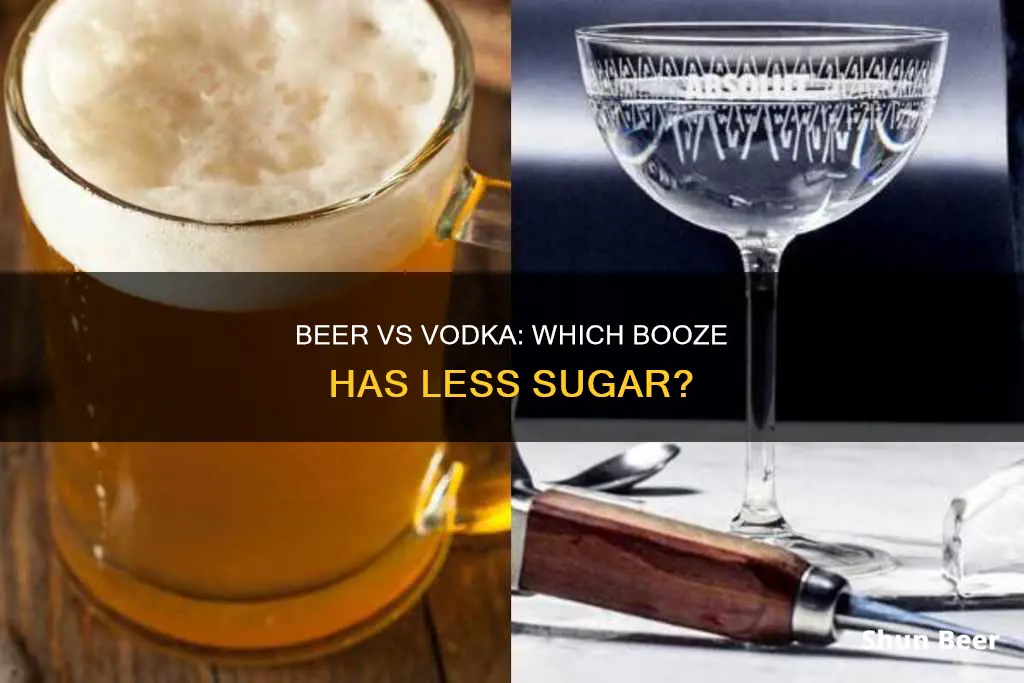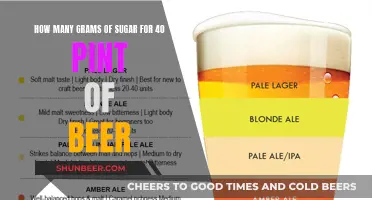
Alcoholic drinks can be a confusing topic when it comes to their nutritional content. While beer and vodka both contain alcohol, the amount of sugar in each drink can vary. Beer, for example, is fermented dry and has no sugar, but it contains a high number of carbohydrates that the body can convert into sugar. On the other hand, hard alcohols like vodka are often distilled and contain no sugar or carbohydrates. However, the mixers that are often added to vodka can be loaded with sugar. So, when comparing beer and vodka, it's important to consider not only the alcohol but also the mixers involved.
What You'll Learn

Beer has zero grams of sugar but is high in carbs
Beer typically has zero grams of sugar but is high in carbs. The sugar content of beer is determined by several factors, including its gravity, the type of yeast used, and any additional flavourings such as honey or corn syrup. While the exact sugar content of beer is challenging to pinpoint due to a lack of mandatory labelling, it is generally very low.
Beer is made from yeast, grains, spices, and water. Sugar is not added directly to the ingredients but is naturally created when the grains are processed and fermented by yeast. This process is called beer gravity, referring to the density of the liquid (wort) extracted from the mashing process during brewing. When the wort has a high sugar concentration, it is called a high gravity wort.
Once yeast is introduced, the sugar content decreases while the alcohol content increases. After fermentation, beer typically consists of 80% fermentable sugars and 20% oligosaccharides, a type of carbohydrate. Oligosaccharides are not digestible by the human body or by yeast, so they do not contribute to the beer's final sugar content.
Regular beers tend to be sugar-free, while light beers typically have less than one gram of sugar per can. Non-alcoholic beers, on the other hand, have the highest sugar content among beer varieties.
When it comes to choosing an alcoholic beverage with low sugar content, hard spirits like gin, vodka, whiskey, and rum are good options, especially when mixed with soda water, fresh citrus juice, or light tonic water. Wine is also a good choice, with red wine having the lowest sugar content among wines, followed by dry white wine.
Heineken Beer Sugar Content: What You Need to Know
You may want to see also

Vodka has zero grams of sugar but mixers often contain sugar
Vodka has zero grams of sugar, but it's important to consider what it's mixed with. If you're looking to cut down on sugar, it's best to opt for vodka with a mixer that has low or no sugar content.
Vodka is a hard alcohol, and hard alcohols don't contain carbohydrates or sugar. This is because the sugar content of the grains and fruits used to make liquor is lost during the distillation process. So, vodka, gin, rum, and whiskey are all good options if you're watching your sugar intake. However, it's important to remember that mixers often contain sugar. Fruit juices, tonic water, and soda can add significant amounts of sugar to your drink. For example, for every ounce of soda, there are approximately 4 grams of sugar. Tonic water and juice have a similar sugar content. So, if you're looking to keep your sugar intake low, it's best to mix your vodka with soda water, a squeeze of lemon or lime, or a light tonic water.
If you're looking for a low-sugar drink, it's also worth considering wine. Red wine, in particular, has received attention for its potential health benefits due to its chemical compounds, polyphenol, and resveratrol. A serving of red wine (250ml) contains less than 1 gram of sugar. White wine has slightly more, with 1.5 grams of sugar per 250ml serving. However, it's important to note that the sugar content of wine can vary widely depending on the type and brand. Dessert wines, for example, can have up to 8 grams of sugar per serving.
Beer also has a lower sugar content than wine or liquor. Regular beer typically has zero grams of sugar, but it has a higher carbohydrate content per serving. Light beer is a better option if you're looking for a healthier choice, as it has fewer carbohydrates and less than half a gram of sugar. However, it's important to note that non-alcoholic beers often have much higher sugar content, with up to 29 grams of sugar.
Cider Beers: Sugar Content and Health Considerations
You may want to see also

Red wine has less sugar than white wine
When it comes to alcohol, it's no secret that some drinks contain a lot of sugar. The amount of sugar in a bottle of wine can vary from 4 grams to 220 grams per litre. While a standard beer contains 155 calories and 12.8 grams of carbs, and a light beer has 103 calories and 5.81 grams of carbs. Vodka, on the other hand, has around 55 calories per shot, but when mixed with a drink like cola, the sugar content increases to 17.5 grams.
If you're looking to cut down on sugar, red wine is a good option. Red wine has the lowest sugar content of all wines, with an average of around 0.9 grams per 175ml serving. That's about 1/4 of a teaspoon of sugar per 250ml glass. White wines, on the other hand, will usually have around 1.4 grams of sugar per 175ml serving, although this varies by type. A dry white wine will have significantly less sugar than a sweet white wine. For a 250ml glass, you're looking at around 1.5 grams for the dry type and 14.5 grams for the sweet kind.
So, if you're looking for a drink with less sugar, red wine is a better option than white wine. But remember, even low-sugar alcohol should be consumed in moderation. The recommended number of alcohol units per week for both men and women is 14 units, which equates to approximately 1.5 bottles of 12% ABV wine.
Candi Sugar's Influence on Beer: A Belgian Twist
You may want to see also

Hard liquor has no sugar but liqueurs do
When it comes to alcoholic drinks, it's important to understand the difference between hard liquor and liqueurs. Hard liquors, such as vodka, gin, whiskey, and rum, are distilled to a high alcohol volume and are typically sugar-free. On the other hand, liqueurs are made by infusing liquor with fruit and spice flavors and then adding sugar. This results in a much higher sugar content, with liqueurs containing at least 10 grams of sugar per ounce.
So, if you're looking to cut down on sugar, opting for a hard liquor like vodka or whiskey is a better choice than a liqueur. However, it's important to remember that the mixers used in cocktails can also add significant amounts of sugar. Fruit juices, soda, and tonic water can all contain high levels of sugar, so they may not be the best choice if you're watching your sugar intake. Instead, consider mixing your hard liquor with soda water, a squeeze of fresh lemon or lime, or a light tonic water to keep the sugar content low.
While hard liquors are a good option for those watching their sugar intake, it's worth noting that they can still be high in calories. A shot of vodka may only have 55 calories, but a vodka and cola can have up to 200 calories. So, if you're counting calories as well as sugar, it's important to be mindful of both the liquor and the mixer you choose.
Additionally, while hard liquors have no sugar, the fermentation process used to make wine means that it also has a very low sugar content. Red wine typically has less than 1 gram of sugar per serving, while white wine has around 1.5 grams. So, if you're looking for a drink with a more casual image than straight hard liquor, wine is a good option that won't add much sugar to your diet.
In summary, hard liquor has no sugar, but liqueurs have a high sugar content due to the addition of sugar during the infusion process. When choosing an alcoholic drink, consider both the liquor and the mixer to keep your sugar intake in check. Wine is also a good option, as it has a very low sugar content. However, don't forget to consider calories as well as sugar, as these can also add up, especially with mixers.
Dark Beer's Sweet Secret: More Sugar, More Flavor?
You may want to see also

Alcohol lowers blood sugar
Alcohol can lower blood sugar, but it is important to understand the nuances and risks involved. Firstly, let's address the role of the liver in maintaining blood sugar levels. The liver is responsible for releasing glucose into the bloodstream to regulate blood sugar levels. However, when alcohol is consumed, the liver prioritises breaking down alcohol over its usual function of releasing glucose. This interruption in glucose release can lead to a rapid drop in blood sugar levels, a condition known as hypoglycemia.
The risk of hypoglycemia is particularly relevant for individuals with diabetes. For those taking insulin or certain diabetes medications, alcohol can interfere with the effectiveness of these treatments, further increasing the risk of low blood sugar. Additionally, drinking on an empty stomach or without accompanying food can exacerbate this effect. Therefore, it is generally recommended to consume alcohol with meals or snacks to help maintain stable blood sugar levels.
The amount and frequency of alcohol consumption also play a role in blood sugar management. The more drinks consumed at one time and the higher the frequency of drinking, the greater the risk of hypoglycemia. This is why moderation is crucial. For context, moderation is typically defined as no more than one drink per day for women and no more than two drinks per day for men. Excessive drinking, defined as more than three drinks daily, can lead to higher blood glucose levels and A1C levels.
It is worth noting that while alcohol can lower blood sugar levels, certain alcoholic beverages, such as beer and sweetened mixed drinks, are high in carbohydrates, which can raise blood sugar levels. Additionally, alcohol is calorie-dense, and these calories are stored in the liver as fat, leading to insulin resistance and potentially higher blood sugar levels over time. Therefore, while alcohol may have a short-term blood sugar-lowering effect, it can contribute to more complex long-term blood sugar management issues.
Sour Beers: High Sugar Content or Healthy Choice?
You may want to see also
Frequently asked questions
Vodka has less sugar than beer. Beer has zero grams of sugar per serving, but it has lots of carbs, which the body turns into sugar. Vodka, on the other hand, has no sugar or carbs per serving.
The recommended daily sugar intake from the NHS is 50 grams for women and 70 grams for men.
A 7.5-ounce vodka soda has about 133 calories and 0 grams of carbs.
Regular beer has 12 grams of carbohydrates per serving but zero grams of sugar. Light beer has less than half a gram of sugar.
Other drinks with low sugar content include red wine, whiskey, gin, and tequila.







